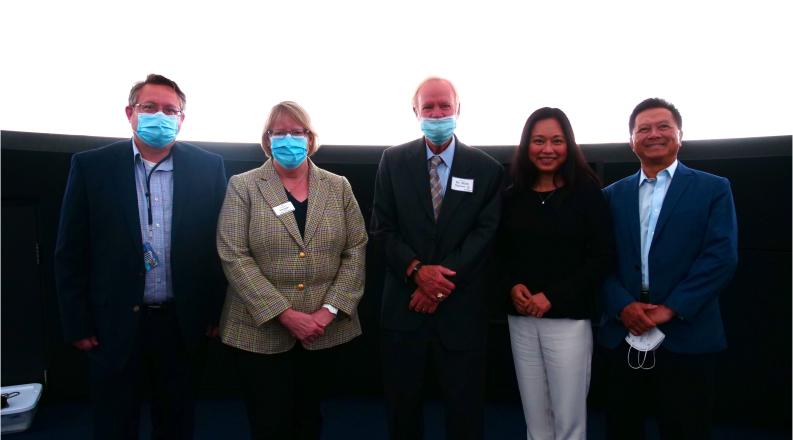L-R: Mark Thiemens, Dean Gail Dodge and Michael and Kimthanh Lê
By: Tiffany Whitfield
All the stars were in alignment on Thursday, October 14 at Old Dominion University as alumnus, Mark Thiemens, Ph.D. gave the first in-person Public Science Lecture at the Michael and Kimthanh Lê Digital Theater and Planetarium inside the New Chemistry Building. Students, alumni, faculty, and guests from the public listened to Thiemens lecture about "Uncovering the Origin and Evolution of Life and the Solar System Using Isotope Ratios." His topic may have been complex, but his talk intrigued every listener in attendance both young and old.
Thiemens, the distinguished professor of Chemistry & Biochemistry and chancellors associate chair at the University of California, San Diego took the audience on a trip through time. He discussed what the Earth was like 3.8 billion years ago, transited the prehistoric era, led listeners to the present, and even guided the audience to how humans could live on the moon and Mars in the future.
Thiemens is a globally recognized scientist who has worked with NASA, military installations and multiple research institutions and facilities and began his career as an Oceanography student at ODU in the 1960's. "If you want to leave the planet (Earth) or understand the planet you live on, you must know the environment, physics, astronomy, biology because your lives depend on it," said Thiemens. He's learned an enormous amount about Earth because his research has taken him to Antarctica, China, Greenland, Germany, Tibet and both the North and South Poles, the Old Silk Route, traveled the Himalayas just to name a few. His career has expanded over its 45 years, and he's learned a lot about Earth and what it would mean to live on another planet.
During his lecture, Thiemens showed images of his research to better understand the beginning of time and how that evolution will impact living on another planet. "It's an honor to give a talk in this beautiful building and it's fitting to have this talk in the planetarium," said Thiemens
"Professor Thiemens is an outstanding researcher with an excellent international reputation," said Gail Dodge, dean of the College of Sciences. "His lecture was fascinating - he showed how his research uses concepts and techniques from physics, chemistry, oceanography, and rocket science to study the origin of life on Earth and the possibility of making Mars habitable for humans."
Thiemens taken samples of ice from Antarctica in minus 50-degree temperatures. "In the South Pole, we're seeing individual events from the equator, and we learned a lot about transport and ozone cycle," said Thiemens. He's done the same drilling in Greenland. "The most interesting place of understanding climate is in Tibet," said Thiemens. "Tibet is so big, it influences the Indian Ocean, and if it melts, everyone in this region of the world is affected."
The question he posed to the audience was, "how do we know the climate has changed?" "Sea levels changes, you live in Tidewater, you know this," said Thiemens. Through his research, Thiemens has learned a lot about the planet. "Everything is connected to everything," said Thiemens.
Following his lecture, the audience asked questions about isotopes, climate change and his research. Thiemens breadth of knowledge was heard through each response he gave.
Thiemens believes this generation will be poised to live on another planet. "Living on the moon or Mars is important to the development of our future needs and we can get there by understanding the environments on Earth."



